人教版七年级下英语Unit2 Section A(1a—2d)练习及解析
Unit2SectionA(1a2d)课件初中英语人教版新目标七年级下册
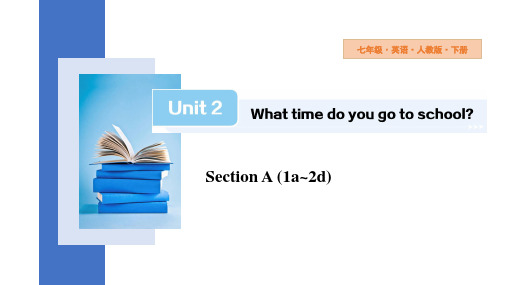
ADEFCB
顺序:_________
2.听2a录音,回答问题。
(1)How many brothers does Jim have?
Two.
(2)How many showers (淋浴器) do they have?____________
Only one.
(3)Is it difficult
for them to take a shower?
注意第三人称单数的正确使用。
Time People
You
Your
friend
Your
father
Your
mother
get up
6:00
6:10
5:50
5:30
get dressed
6:30
6:40
6:20
6:00
brush teeth
6:40
6:50
6:30
6:05
eat breakfast
6:50
七年级·英语·人教版·下册
Section A (1a~2d)
单元话题
日常活动
教材分析
在本单元中,学生主要学习用when和what time引导特殊疑
问句询问时间的表达方式;学习表示频率的副词。通过本单元
的学习,学生学会合理安排自己的日常活动,并且能够了解和转
述他人的日常生活安排。
Section A(1a~2d)通过活动名称与图中时间的配对,引出本
thirty .
B:It’s six
__________
A:What time do you usually get up?
get up at six thirty .
人教版七年级下册英语Unit2 Section A 1a-2d 作业设计

年级、册次 七年级下册 单元名称 Unit 2 What time do you go to school?课时 第1课时节点Section A 1a-2d课型听说课作业类型作业内容设计意图和素材来源预习作业 (必做)一、口语练习(单词预习) 请翻开Uint2的单词表,跟着录音朗读P7-p8的单词,并尝试录下你自己的单词朗读发给我。
也许你的录音就会成为课堂的领读者,你会成为我们班级本课时的“英语单词播音员”。
设计意图:设置“英语单词播音员”,提高学生的学习兴趣,同时培养学生的自学能力。
通过听录音反复跟读,有助于提高学生的语音、语调,培养学生的语感。
素材来源:原创二、请按要求填空。
1.请观看以下图片,你能用英语短语表达出他们在做什么吗?1) take a shower 2) 3) 4) 5) 6)2. 你能用英语说出下面的时间吗?1)seven o ’clock 2) 3) 4)设计意图:生动形象的动漫图片激发学生的学习兴趣、引发学生思考,同时帮助学生复习小学六年级时期所学习过的日常活动以及时间的英语表达法,也为新课做好铺垫。
素材来源:原创(图片选取于网络)预习作业(必做)三、请你用英语跟同伴谈谈你日常活动的时间。
(温馨提示:你们可以参照下面的对话哦!)A : What time do you usually get up?B : I usually get up at six forty .A : When do you eat breakfast?B : I usually eat breakfast at seven ten .设计意图:温故知新。
学生在小学六年级下册已经学过出行方式的表达。
课前让学生练习对话,既可以帮助学生对巩固旧知识又为新知识的学习作好铺垫。
素材来源:原创巩固作业(必做)一、角色扮演。
听录音,与你的同伴一起防读2d, 注意语音与语调与角色的感情色彩。
让我们来PK一下,看看哪组是“角色大模王”。
2024英语学案第1课时SectionA1a-2d 分层作业设计(人教版七年级下)附答案
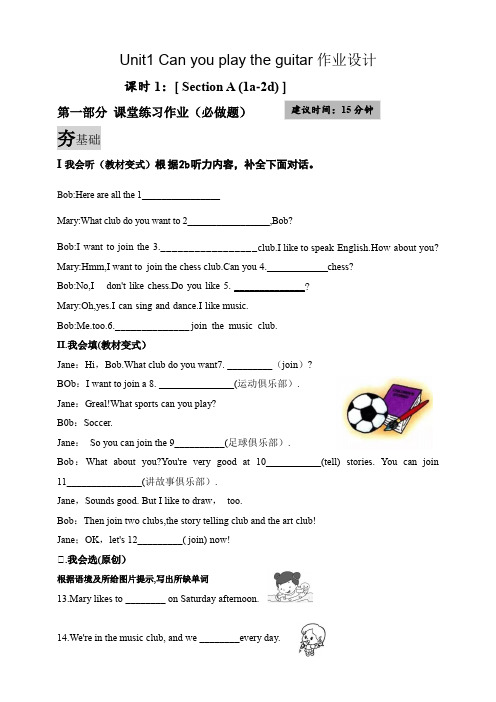
Unit1 Can you play the guitar作业设计课时1:[ Section A (1a-2d) ]建议时间:15分钟第一部分课堂练习作业(必做题)夯基础I 我会听(教材变式)根据2b听力内容,补全下面对话。
B ob:Here are all the 1________________Mary:What club do you want to 2_________________,Bob?Bob:I want to join the 3._________________club.I like to speak English.How about you? Mary:Hmm,I want to join the chess club.Can you 4.____________chess?Bob:No,I don't like chess.Do you like 5. ______________Mary:Oh,yes.I can sing and dance.I like music.Bob:Me.too.6.______________ join the music club.II.我会填(教材变式)Jane:Hi,Bob.What club do you want7. _________(join)?BOb:I want to join a 8. _______________(运动俱乐部).Jane:Greal!What sports can you play?B0b:Soccer.Jane:So you can join the 9__________(足球俱乐部).Bob:What about you?You're very good at 10___________(tell) stories. You can join 11_______________(讲故事俱乐部).Jane,Sounds good. But I like to draw,too.Bob:Then join two clubs,the story telling club and the art club!Jane;OK,let's 12_________( join) now!Ⅲ.我会选(原创)根据语境及所给图片提示,写出所缺单词13.Mary likes to ________ on Saturday afternoon.14.We're in the music club, and we ________every day.15.Jack likes to ________ pictures.16.—Can the bear ________?—Yes, it can dance well.17.Lily likes to play the ________ in the park.练能力IV阅读理解(改编)(限时练5分钟)Helen likes erhu music. One of her classmates Zheng Jie is in the erhu club at school. He often plays the erhu for the school music festival.One day after school, Helen says to her mom, “The erhu music Zheng Jie plays is so great. I also want to learn it. I want to take some erhu lessons, Mom.”“I don't think you can do so much. It takes much time to learn the erhu,” Mom says. “Now you are in the art club and the dance club in your school. You have to draw and dance. Are you sure you have time for the erhu?”Helen knows Mom is right. If she wants to learn the erhu, she will have to give up (放弃) a club. Helen loves her clubs and she doesn't want to do that.“Why don't you dance when Zheng Jie is playing the erhu?” Helen's mom says. “You can dance and enjoy (欣赏) the music at the same time (同时).”“Sounds great!” Helen says. “I'll go and ask Zheng Jie.”( )18.What can Zheng Jie do?A.Play the pipa.B.Play the guzheng.C.Play the erhu.D.Play the dizi.( )19.What does the underlined word “learn” mean in Chinese?A.学习B.忘记C.创造D.编织( )20.What may (可能) Helen do at last (最后)?A.Give up the art club.B.Dance and enjoy the erhu music at the same time.C.Learn erhu with her mother.D.Let Zheng Jie learn to dance.答案I.1 clubs2 join3 English4 play5 music6 Let’sII7 to join 8 sports club 9 soccer club 10 telling 11.the story telling chub 12joinIII.13.swim 14.sing15.draw 16.dance17.guitarIV【主旨大意】本文主要讲述的是Helen想要参加二胡俱乐部,于是与妈妈商讨是否可以参加二胡俱乐部,妈妈不愿意让俱乐部过多占用Helen的时间,于是给出了一个折中的主意。
人教版七年级下英语Unit1 Section A(1a—2d)练习及解析
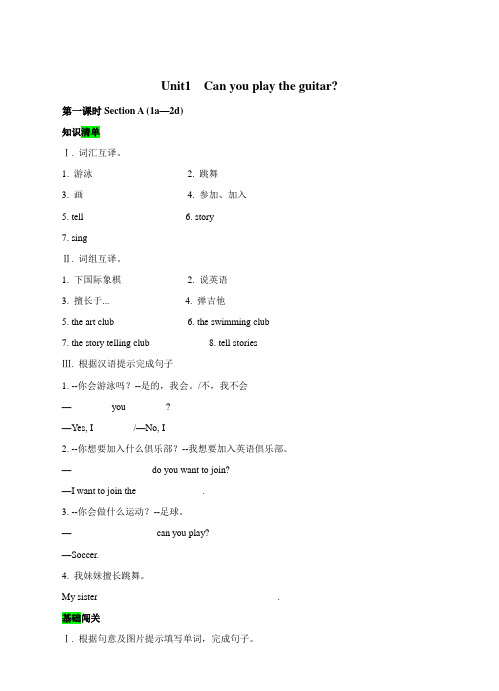
Unit1 Can you play the guitar? 第一课时Section A (1a—2d)知识清单Ⅰ. 词汇互译。
1. 游泳________2. 跳舞_________3. 画_________4. 参加、加入_________5. tell ____________6. story ___________7. sing ____________Ⅱ. 词组互译。
1. 下国际象棋_________2. 说英语_____________3. 擅长于...____________4. 弹吉他_____________5. the art club _____________6. the swimming club __________7. the story telling club __________ 8. tell stories _______________ Ⅲ. 根据汉语提示完成句子1. --你会游泳吗?--是的,我会。
/不,我不会—________ you ________?—Yes, I ________/—No, I ________2. --你想要加入什么俱乐部?--我想要加入英语俱乐部。
—________ ________ do you want to join?—I want to join the ______ _______.3. --你会做什么运动?--足球。
—________ _________ can you play?—Soccer.4. 我妹妹擅长跳舞。
My sister _________ _________ ________ __________.基础闯关Ⅰ. 根据句意及图片提示填写单词,完成句子。
1. The _____ isn’t mine. It’s my brother’s.2. Li Jing likes music and he ______ very well.3. My uncle is a sports star. He is good at _________.4. —What can you do?—I can ________.5. Please _________ a letter to your parents.Ⅱ.用所给词的适当形式填空。
2020-2021学年人教版英语七年级下册Unit2SectionA1a—2d教案
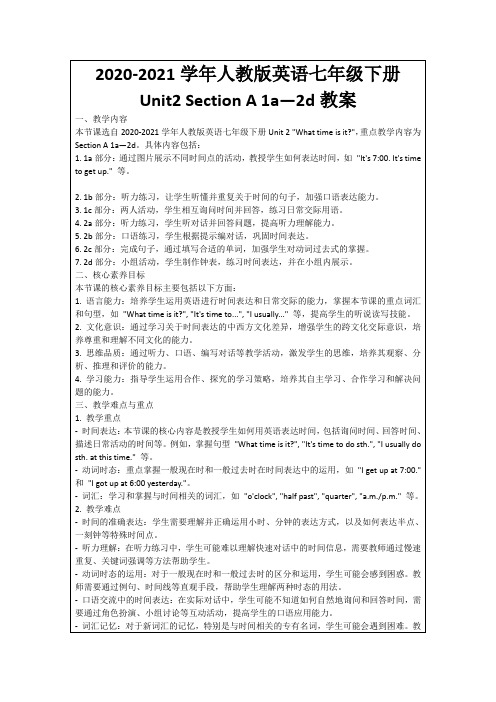
1.理论介绍:首先,我们要了解时间的基本表达方式。时间可以通过小时和分钟来表示,如"It's 7:00.",还可以用"It's time to do sth."来描述该做什么事情的时间。这些表达方式在日常生活中非常重要。
2.案例分析:接下来,我们来看一个具体的案例。这个案例展示了如何通过询问和回答时间来安排日常生活,以及如何使用一般现在时和一般过去时来描述动作。
3.成果展示:每个小组将向全班展示他们的讨论成果和制作的时钟。
(四)学生小组讨论(用时10分钟)
1.讨论主题:学生将围绕“时间表达在日常生活中的应用”这一主题展开讨论。他们将被鼓励提出自己的观点和想法,并与其他小组成员进行交流。
2.引导与启发:在讨论过程中,我将作为一个引导者,帮助学生发现问题、分析问题并解决问题。我会提出一些开放性的问题来启发他们的思考。
2020-2021学年人教版英语七年级下册Unit2 Section A 1a—2d教案
一、教学内容
本节课选自2020-2021学年人教版英语七年级下册Unit 2 "What time is it?",重点教学内容为Section A 1a—2d。具体内容包括:
1. 1a部分:通过图片展示不同时间点的活动,教授学生如何表达时间,如"It's 7:00. It's time to get up."等。
-动词时态:重点掌握一般现在时和一般过去时在时间表达中的运用,如"I get up at 7:00."和"I got up at 6:00 yesterday."。
-词汇:学习和掌握与时间相关的词汇,如"o'clock", "half past", "quarter", "a.m./p.m."等。
人教版七年级英语下册Unit 2 Section A (1a-2d) 教案
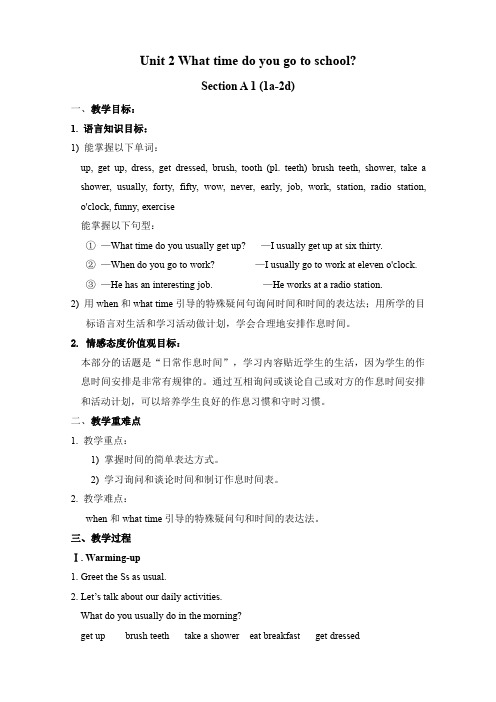
Unit2What time do you go to school?Section A1(1a-2d)一、教学目标:1.语言知识目标:1)能掌握以下单词:up,get up,dress,get dressed,brush,tooth(pl.teeth)brush teeth,shower,take a shower,usually,forty,fifty,wow,never,early,job,work,station,radio station, o'clock,funny,exercise能掌握以下句型:①—What time do you usually get up?—I usually get up at six thirty.②—When do you go to work?—I usually go to work at eleven o'clock.③—He has an interesting job.—He works at a radio station.2)用when和what time引导的特殊疑问句询问时间和时间的表达法;用所学的目标语言对生活和学习活动做计划,学会合理地安排作息时间。
2.情感态度价值观目标:本部分的话题是“日常作息时间”,学习内容贴近学生的生活,因为学生的作息时间安排是非常有规律的。
通过互相询问或谈论自己或对方的作息时间安排和活动计划,可以培养学生良好的作息习惯和守时习惯。
二、教学重难点1.教学重点:1)掌握时间的简单表达方式。
2)学习询问和谈论时间和制订作息时间表。
2.教学难点:when和what time引导的特殊疑问句和时间的表达法。
三、教学过程Ⅰ.Warming-up1.Greet the Ss as usual.2.Let’s talk about our daily activities.What do you usually do in the morning?get up brush teeth take a shower eat breakfast get dressedgo to schoolⅡ.Presentation1.出示几幅反映日常事务(如:起床、上学、跑步等)的图画,引导学生谈论这些日常事务go to school,get up,run,take a shower,eat breakfast等,学习有关的动词短语。
人教版英语七年级下册Unit2:SectionA(1a-2d)精品教案
Unit2: Section A (1a-2d)精品教案一、教学目标:1. 语言知识目标:1) 能掌握以下单词:up, get up, dress, get dressed, brush, tooth (pl. teeth) brush teeth, shower, take a shower, usually, forty, fifty, wow, never, early, job, work, station, radio station, o'clock, funny, exercise能掌握以下句型:①—What time do you usually get up? —I usually get up at six thirty.②—When do you go to work? —I usually go to work at eleven o'clock.③—He has an interesting job. —He works at a radio station.2) 用when和what time引导的特殊疑问句询问时间和时间的表达法;用所学的目标语言对生活和学习活动做计划,学会合理地安排作息时间。
2. 情感态度价值观目标:本部分的话题是“日常作息时间”,学习内容贴近学生的生活,因为学生的作息时间安排是非常有规律的。
通过互相询问或谈论自己或对方的作息时间安排和活动计划,可以培养学生良好的作息习惯和守时习惯。
二、教学重难点1. 教学重点:1) 掌握时间的简单表达方式。
2) 学习询问和谈论时间和制订作息时间表。
2. 教学难点:when和what time引导的特殊疑问句和时间的表达法。
三、教学过程Ⅰ. Warming-up and revision1. Greet the Ss as usual.2. Watch a short video program about daily activities.Ⅱ. Presentation1. 出示几幅反映日常事务(如:起床、上学、跑步等)的图画、幻灯片或播放课件,引导学生谈论这些日常事务go to school,get up,run,take a shower,eat breakfast 等,学习有关的动词短语。
人教版七年级下册英语unit2第一课时sectiona(1a--1c)(含答案)
Unit2 What time do you go to school?第一课时 Section A (1a--1c)一、根据句意及图片提示完成句子,每空一词。
l 题图 2题图 3题图 4题图 5题图1.He wants to after dinner.2.--Do you at seven'?--Yes, I do.3.Sarah usually at about 7:00 in the morning.4.What time does Mary usually ?5.The girl is five and she can now.二、单项选择。
( )6.Little Jerry has six now.A. teethB. toothC. toot hes( )7.Bob.your shoes are not tidy. them now.A.ShowB.DrawC.Brush( )8. --What time is it now?--It is eight forty. We often have breakfast eight fortyA./;at B .at;/ C./;/( )9. --Sally,can you help your sister ?--OK,Mom.But where are her clothes?A. brush her teethB.get dressedC.watch TV ( )10.Look at the clock.It's now.A.nine thirtyB.ten fifteenC.nine forty five( ) 11.-- ?--Let me think.In january.A.Where is your roomB. What time do you get upC.When is your school trip三、按要求完成下列句子。
人教21英语学案七年级下测Unit 2 Section A (1a-2d)
“给……穿衣服”, 宾语通常是人 “穿着; 戴着”, 表示状态, 宾语可以是衣、帽, 也可以是饰物、奖章等
put on “穿上; 戴上”, 强调“穿”“戴”的动作, 后接衣服、鞋帽等
*Look! The girl is wearing a funny hat. 看! 那个女孩正戴着一顶滑稽的帽子。 *You’d better put on your coat! It’s too cold outside. 你最好穿上你的外套! 外 面太冷了。
( B )②(2020·泰州质检)—BeiDou Navigation Satellites(北斗导航卫星) ______around 9: 46 Tuesday were successfully(成功地) sent up from Xichang on Long March 3Bs ______June 23, 2020. —Really? I am proud of our country. A. on; on B. at; on C. on; in D. at; in ( C )③My uncle was born______1986. A. on B. at C. in D. of
【语篇·挑战】 根据教材 P8 2d内容, 回答下面问题。 1. When does Scott usually get up? _A_t_e_i_g_h_t_t_h_ir_t_y_a_t_n__ig_h_t_._ 2. What does Scott usually do at about ten twenty? _H_e__u_s_u_a_ll_y_e_x_e_r_c_is_e_s_. _ 3. When does Scott go to work? _A_t__el_e_v_e_n_o_’_c_l_o_ck__.
- 1、下载文档前请自行甄别文档内容的完整性,平台不提供额外的编辑、内容补充、找答案等附加服务。
- 2、"仅部分预览"的文档,不可在线预览部分如存在完整性等问题,可反馈申请退款(可完整预览的文档不适用该条件!)。
- 3、如文档侵犯您的权益,请联系客服反馈,我们会尽快为您处理(人工客服工作时间:9:00-18:30)。
Unit2 What time do you go to school? 第一课时Section A(1a—2d) 知识清单 Ⅰ. 词汇互译。 1. tooth ___________ 2. usually __________ 3. forty___________ 4. early __________ 5. 从不____________ 6. 五十_____________ 7. 工作、职业____________ 8. 锻炼、练习_________ Ⅱ. 短语大全。 1. 起床,站起 _______ 2.穿上衣服 _________ 3. 洗淋浴________ 4. 涮牙 __________ 5.吃早餐_________ 6. 做……迟到__________ 7. go to school _______ 8. radio station __________ 9. at night_________ 10. from…to…_______ 11. in the morning__________ 12. go to work__________ Ⅲ. 根据汉语提示完成句子 1. 那是做早餐有意思的时间。 That's _____ _______ ________ _______ breakfast. 2. —你通常什么时间起床? —我总是在五点四十起床。 —______ ______ ______ you usually get up? —I always get up ________ ________ ___________. 3. 玛丽在五点五十洗淋浴。 Mary ________ ________ ______ at five fifty. 4. 我上班从不迟到。 I’m ______ ________ ______ work. 基础闯关 Ⅰ. 根据句意及汉语提示填写单词,完成句子。 1. What’s the time? It’s six __(四十). 2. My father w_______ in a school. 3. I usually take a s________ in the evening. 4. My mother always gets up e_____. 5. I like my ________(工作). It’s very interesting. Ⅱ. 用所给词的适当形式填空。 1. The girl can get ______(dress) by herself.(她自己) 2. Tom’s ____(tooth) are big and white. 3. Mr Wang usually _________(exercise)in the morning. 4. My grandfather usually tells a ______(fun) story to us. 5. I have two ____(brush) in my bag. Ⅲ. 完成句子。(每空一词) 1.你的父亲七点钟去上班吗? ______ your father ______ ______ ______ at seven? 2.你通常几点去睡觉? ______ ______ do you usually ________ ________ ________? 3.请仔细地听老师讲课。 Please ______ ______ the teacher carefully(仔细地). 4. 我的弟弟在下午做家庭作业。 My brother ______ ______ ______ in the afternoon. 5.你是什么时候到达广州的? When do you _______ ______ GuangZhou? Ⅳ. 句型转换。 1. What’s the time? (改为同义句) ______ ________ is it? 2. His parents usually go to work at seven o’clock. (改为一般疑问句) _______ his parents usually ______ to work at seven o’clock? 3. He gets home at five in the afternoon. (对画线部分提问) ________ ______ ______ he ______ home in the afternoon? 4. Jack has one shower. (对画线部分提问)
_______ _______ ________ does Jack ________? 5. Jim eats breakfast. He eats breakfast at home. (合并为一句) Jim ______ breakfast ______ _____. Ⅴ. 单项选择。 ( )1. My mother ______ at five o’clock. A. usually gets B. usually gets up C. gets up usually D. get usually up ( ) 2. Sam doesn’t like getting up early, so he is often late _______ school. A. at B. for C. with D. of ( ) 3. —Does she _________ a shower at six o’clock? A. takes B. take C. make D. play ( )4. —What time does he go to school? —_________ A. On Fridays B. In the morning C. From Monday to Friday D. At eight o’clock ( )5. —________ do they go to work? —At six twenty. A. What B. What time C. Where D. Why 创新提升 Ⅰ. 情景交际。有一项是多余的。 A. Oh, I don’t. I usually go to bed at about 10:00. B. Me? I get up at 9:00. C. Do you get home early? D. Well. What do you usually do in the evening? E. Do you get up early, Linda? F. Then I take a shower and eat breakfast at 7:00. Tony: 1._______ Linda: Yeah, I get up at six o’clock and run in the morning. 2. _____ What about you? Tony: 3. ________ Linda: Nine o’clock? Tony: Yes, I go to school in the afternoon. Linda: 4. ________ Tony: I usually watch TV in the evening. Linda: Me, too. I watch TV at 8:00 and go to bed at nine o’clock. Tony: 5. ________ 1._______ 2._______ 3._______ 4._______ 5._______ Ⅱ. 阅读文章,完成表格。 My name is Tom. I usually get up at six in the morning. Then I have a shower at six-thirty. I have breakfast at seven o’clock, I usually go to school at eight-thirty. School begins (开始)at nine o’clock, and I have lunch at school at twelve o’clock. In the afternoon I often play football at sixteen-thirty.School is over(放学) at fifteen-thirty and I have dinner at home at eighteen o’clock. At about twenty—one o’clock I go to bed . get up at six in the morning 1. _______ at six-thirty 2. ________ at seven o’clock 3. ________ at eight-thirty 4. ________ at twelve o’clock 5. ________ at sixteen-thirty 中考全练 ( ) 1. 【2014重庆】 I have ______ English dictionary and it helps me a lot. A. a B. an C. the D. / ( ) 2. 【2014重庆】 —What time do you usually go to school, Jack? —_______ about half past seven. A. On B. In C. At D. For ( ) 3. 【2013湖南邵阳】 A terrible earthquake(地震) hit Ya’an, Sichuan Province ________ the morning _________ April 25. A. in; in B. at; on C. on; of ( ) 4. 【2013湖南株洲】 The students will have a party __________ the evening of June 18th. A. on B. at C. in 5. 【2013重庆】 She often has dinner at half past six in the evening. (对划线部分提问) __________________________ 6. 【2014来宾】 It is a good habit to brush your t________ three times a day. 7. 【2013乌鲁木齐】 The little child is too young to _______(穿衣) himself. Let’s help him. 8. 【2013扬州】 Jim’s parents will celebrate their ______(四十) years of marriage this Sunday.
